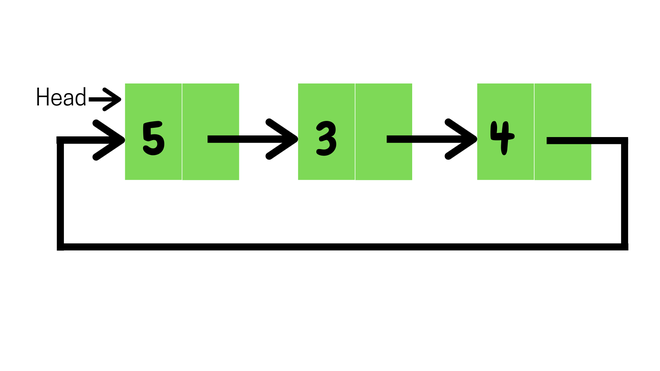Java程序从循环链表的末尾删除一个节点
在本文中,我们将学习如何从循环链表的末尾删除节点。考虑如下所示的链表:

例子:
Input : 5->3->4->(head node)
Output: 5->3->(head node)我们将首先初始化列表并使用 addNode() 方法向其中添加一些数据,然后根据以下方法进行操作:
情况 1 :列表为空。
如果列表为空,我们将简单地返回。
情况 2 :列表不为空
- 删除():
- 如果不存在节点,则从函数返回
- 如果只有一个节点,则将 head 和 tail 都设置为 null
- 如果它有多个节点,则删除前一个头节点,头将指向列表中的下一个节点,尾将指向新的头。
- printNode() 会将列表中存在的所有节点打印为:
- 定义了指向头部的节点电流
- 打印 current.val 直到它再次开始指向头部
- 在每次迭代中,它将指向下一个节点
代码:
Java
// Java Program to Delete a Node From the Ending of the
// Circular Linked List
public class Main {
// Represents the node of list.
public class Node {
int val;
Node next;
public Node(int val) { this.val = val; }
}
// Initialising head and tail pointers
public Node head = null;
public Node tail = null;
// add new node to the end
public void addNode(int val)
{
// Creating new node
Node node = new Node(val);
// head and tail will point to new node
// if list is empty
if (head == null) {
head = node;
tail = node;
node.next = head;
}
// otherwise tail point to new node and
else {
tail.next = node;
tail = node;
tail.next = head;
}
}
// Deletes node from the beginning of the list
public void delete()
{
// returns if list is empty
if (head == null) {
return;
}
// otherwise head will point to next element in the
// list and tail will point to new head
else {
// if list contains more than one element
// then loop will iterate
// till second last element
// is pointing to tail
if (head != tail) {
Node current = head;
while (current.next != tail) {
current = current.next;
}
// Second last element is the new tail
tail = current;
tail.next = head;
}
// if the list contains only one element
// then both head and tail will point to null
else {
head = tail = null;
}
}
}
// displaying the nodes
public void printNode()
{
Node current = head;
if (head == null) {
System.out.println("List is empty");
}
else {
do {
System.out.print(" " + current.val);
current = current.next;
} while (current != head);
System.out.println();
}
}
public static void main(String[] args)
{
Main list = new Main();
// Adds data to the list
list.addNode(5);
list.addNode(3);
list.addNode(4);
// Printing original list
System.out.println("Original List: ");
list.printNode();
// deleting node from ending
// till the list is empty and
// displaying the Updated list
while (list.head != null) {
list.delete();
// Printing updated list
System.out.println("Updated List: ");
list.printNode();
}
}
}输出
Original List:
5 3 4
Updated List:
5 3
Updated List:
5
Updated List:
List is empty